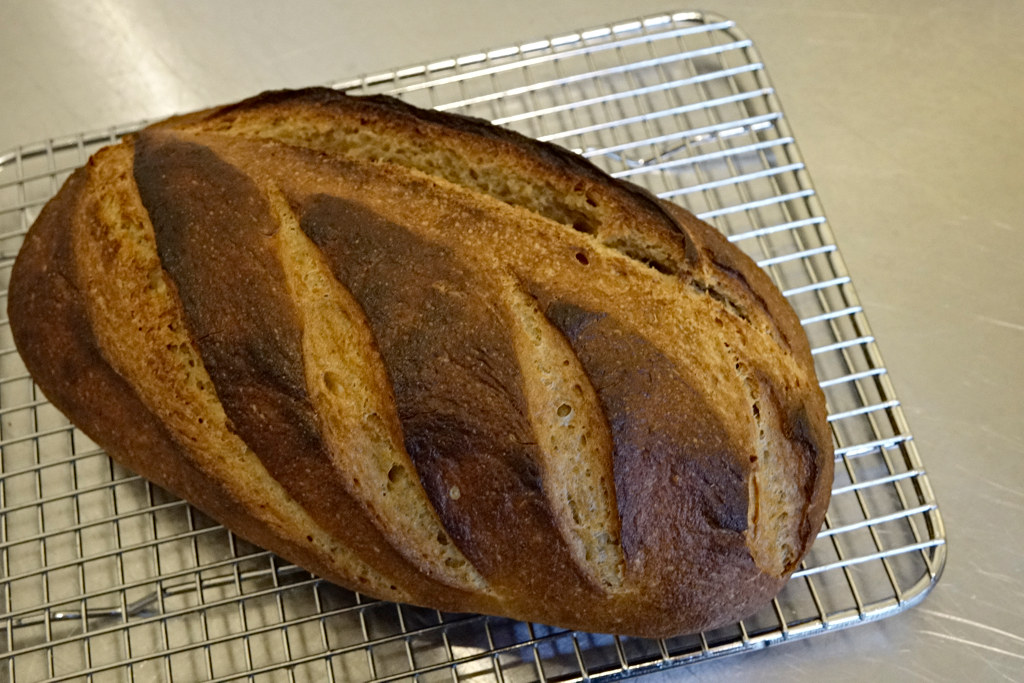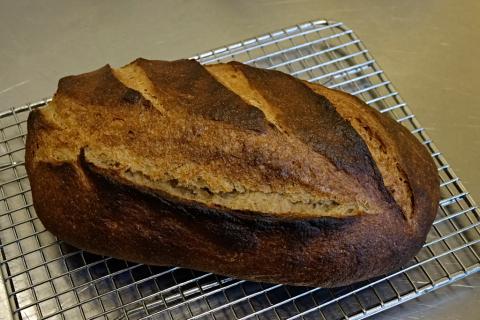
Atta Flour - Yes, You Can (continued)!

Continuing on with bread made with atta flour (see my previous post at https://www.thefreshloaf.com/node/74124/atta-flour-yes-you-can), here's a loaf with a few changes. As a reminder, this atta flour is a whole-wheat flour called "Sujata Chakki Atta", which is very finely ground, so finely that even much of the bran will pass through a #50 screen. This screen only removes around 5% of the weight of the flour. This is a brand from General Mills India.
What was different this time -
- Didn't sift out the bran;
- Slightly unusual bulk ferment schedule;
- Stretched the dough much less during shaping.
- Made a batarde instead of a boule.
Let's see the pictures first, then I'll go over the changes.
I didn't sift out the bran because there was so little of it, and it was so fine, that I suspected it wouldn't affect the gluten development. That seems to have been about right.
There were 300g of (unfermented) flour, 80% of which was the atta flour and 20% was King Arthur bread flour. The 100% hydration starter was 90g or 30%. Overall hydration was 81% including the starter ingredients.
The bulk ferment was started late, yet I wanted to bake in the morning. Leaving it on the counter overnight would have been too long, and refrigerating it overnight would have entailed a long wait the next day for bulk ferment to finish. So I put the BF tub into the refrigerator after it had fermented about 4 hours, by which time it had started to rise but only a little. I took it out two hours later and went to bed. The dough fermented on the counter for 7 1/2 hours after that.
This was a little long, and the dough had at least tripled if not more, but I'm used to that. It hadn't collapsed but as you might expect, the dough was a little delicate. It was smooth, highly extensible and had basically no elasticity.
Normally I would have stretched the dough a lot and worked with it to develop its elasticity, but as an experiment I didn't do much of that this time. The idea was that the extensibility could lead to good oven spring as long as the dough could hold its shape during proof. It turned out that's what happened, as the pictures show. The loaf proofed free-standing for 1 1/4 hours, the last 10 minutes uncovered.
The baking schedule was about the same as for the previous loaf. The loaf expanded beautifully, made a good ear, and the crumb is quite decently open for an 80% whole wheat bread. The flavor is rich and wheaty, with a subtle tang from the long bulk ferment that I can barely detect but makes my mouth water as I chew a slice.
These atta loaves have been so good, and the dough so easy to work with, that I don't see any reason to use any other whole wheat flour (except perhaps if you need your flour to be labeled "organic").
TomP






That's a good result Tom, I think the crumb is even better this time around. You got me thinking about atta, and so I had a look at what is available to me...
Despite the above product (Chakki Gold) containing some Durum wheat, it's actually uncommon for atta to be made from Durum wheat.
Wow, that's way more than my local store carries.
BTW, I don't think that the "Chakki Gold" as actually made from durum wheat. The brand I used for this bake, by General Mills India, also has a "Gold" variety but it doesn't use durum. Apparently the "gold" designation is supposed to suggest the highest quality flour. Here's what their web site says about this Gold flour:
"Made of Wheat sourced from the finest wheat fields in Madhya Pradesh, India, Sujata Gold Atta is truly the Gold standard in the Atta category. Rotis made from this 100% Sharbati Wheat are deliciously soft; characterized by a rich, creamy colour & a mouth-watering aroma"
That Sharbati flour it mentions is not durum, so it's clear that "Gold" doesn't necessarily mean durum.
Indeed, I was surprised at the choice available, especially the pack sizes. I am tempted!
Sure, I didn't suggest any connection as to what the "Gold" was referring to, I guess you thought that or misunderstood what I was saying. Matching the comments from Lance in your other atta post, I also have never seen atta flour made from Durum and I don't believe it exists outside the North American market. But interestingly I found this UK product, the one to which I was referring, does include some. A first!
Sharbati wheat is sometimes referred to "The Golden Grain" since the grains have a visually golden appearance and indeed the term Gold could connotate premium quality.
You mention the Sujata brand being Indian but I don't believe this is so. I see signs of North American retail packaging, e.g. Net weight and imperial measures. Same goes for Golden Temple. I'm guessing, contents aside the retail product itself is not an import and therefore I suggest the Sujata brand is actually North American.
It's hard to know. The package is labeled "Manufactured For: General Mills India", with a Mumbai address. It's also labeled "Product of UAE". OTOH the bag has only English writing on it and its weight is given in pounds (kg) which suggests a US market. It seems that Indian wheat is shipped to an Egyptian mill, then packaged (by the mill, I suppose) and shipped to North America. Does that make it an Indian brand?
My local store has a few other brands of atta, but they are all 10 kg sizes and that's way too large for me so I probably won't be trying them.